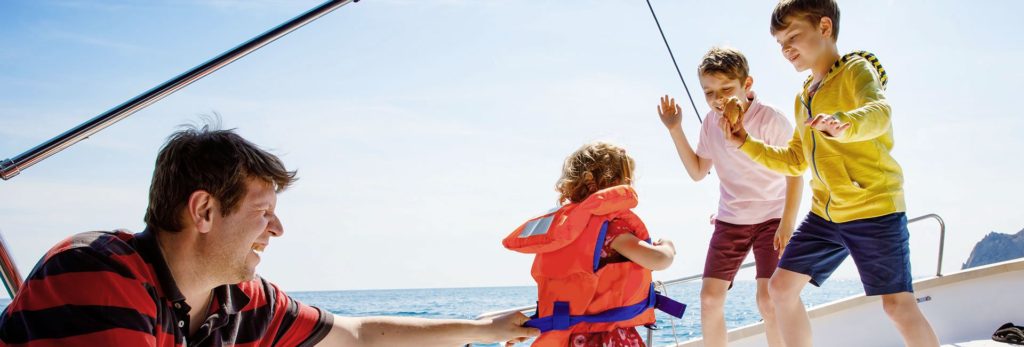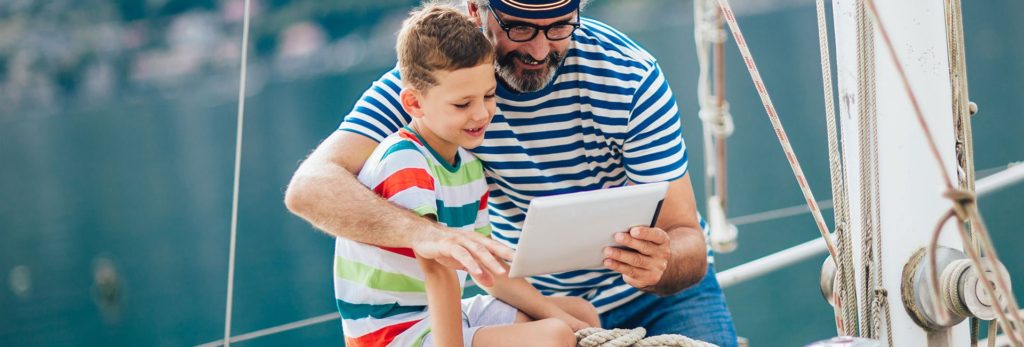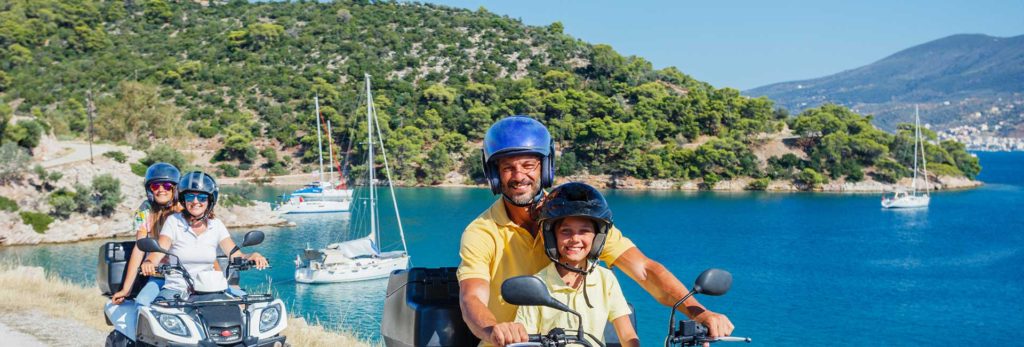Sailing With Family Quick Links
- Sailing With Family | Introduction
- Sailing With Family | Perks
- The Sailing Experience Of A Lifetime
- Sailing With Family Tip #1 | Sailing With Babies
- Sailing With Family Tip #2 | Sailing With Teenagers
- Sailing With Family Tip #3 | To Boat School…Or Not
- Sailing With Family | A Transformative Experience
Sailing With Family | Introduction
Becoming a cruising family is easy…said no one, ever.
And, while parenting on the open seas surely won’t make things any simpler, there are definitely advantages to embracing the sailing lifestyle together as a cruising family. Here are 3 tips for cruising families to ensure a safe and fun sailing experience.
You will explore mind-boggling places, share some hair-raising adventures and witness the most jaw-dropping, incredible natural scenery together. You’ll grow closer as a unit, getting to spend way more quality time in each other’s company than most other families ever get to do.
Sailing With Family | Perks
One of the biggest perks of family boating life? After years of deck-handing duties, continually exploring new places and meeting new people, your children are extremely likely to grow up to be responsible, knowledgeable and confident adults.
Still, taking your nearest and dearest on a family sailing holiday is one thing. Becoming a so-called “cruising family”? A different kettle of fish altogether.
The Sailing Experience Of A Lifetime
While setting out to explore the world by boat as a family is undoubtedly one of the more challenging journeys you will ever undertake, it’s also bound to be one of the most rewarding experiences of your lifetime. In short, when you become a cruising family, your boat will be your means of transport, your home, your kids’ classroom – and the birthplace of many lifelong memories.
You can bet your last ice pack that your grandchildren (and, possibly, their grandchildren) will be hearing about “that time (fill in the epic experience) happened” on your incredibly amazing, once-in-a-lifetime, mega family sailing adventure.

So, what does it take to raise a family while simultaneously ocean adventuring, adulting and co-parenting in ports and marinas all around the globe? For a start, lots and lots of patience, mixed with liberal doses of meticulous planning.
A somewhat laid-back general attitude and an excellent sense of humour will also go a long way toward making your family cruise one for the ages.
Read on for a run-down on the things every cruising family with children should know before setting out on the sailing adventure of a lifetime.
Sailing With Family Tip #1 | Sailing With Babies
Be organised, plan meticulously (and secure the perimeter).
Can you even take a baby sailing?
Relax. Take a deep breath. Sailing with kids and, in particular, cruising with babies and young children has been done before, is happening as you read these very words, and can certainly be managed again (yes, we’re talking about you).
Let’s be honest. Sailing with very young kids is not without its challenges. But it’s not impossible, either. The secret is simply in the planning (to be done before setting sail with your nautical offspring, of course).
Still, just entertaining the thought of embarking on a long voyage with a baby might bring up a gazillion frantic questions. How do you keep a baby safe on a boat? Are there life jackets for babies? Can a baby use any sunscreen? Where do dirty diapers go during an ocean passage?
It’s understandable to feel overwhelmed by it all – especially when you’re an already sleep-deprived, overstretched parent. For now, just take comfort in the fact that many cruising families have reported their tiny ocean adventurers to be excellent shipmates.
Here are some useful pointers for liveaboard cruising with infants or toddlers:
Infants are easy. If you’re going to give birth during your voyage, or if you’re cruising with an infant, consider anchoring your boat in a marina for longer stretches at a time. Doing so will allow you to get used to your new circumstances in a more controlled environment.
Having a port as a base will also allow you to become familiar with new-baby basics like feeding, sleeping, changing and carrying a baby on board. If breastfeeding is an option for you, it will eliminate the hassle of formula buying and mixing, and also the chore of sterilising bottles. Of course, making use of cloth nappies is the greener (and preferable) option. If you’re based in a marina, there should be plenty of water available for doing laundry.
Toddlers are trickier. Once your boat – and baby – start moving, matters will get slightly more complicated. Every trip ashore will require meticulous planning, a life jacket for the baby and a big (waterproof) bag crammed with all the usual baby essentials such as nappies, wipes, blankets and warm clothing, sunscreen, hats, snacks, etc.
You will also have to work out a procedure for passage-making with the baby strapped in a (hands-free) front carrier, for changing nappies while underway and for navigating naptimes on choppy waters. Be prepared – all of the above will be more challenging once the baby gets mobile.
That said, one of the significant advantages of sailing with a baby is that a boat is such a stimulating environment in which to raise a young child. The benefits of your baby growing and learning on a boat will soon be evident.
Safety first. Who would have guessed that a boat is already quite a baby-proof environment? Rounded edges, drawers designed to not fly out at sea, the absence of live electrics at toddler height and handles and grab rails are all things that will make onboard life with baby somewhat easier to manage.
But, understandably, the baby’s onboard safety is every parent’s biggest concern. Child-proof netting along all guardrails, the bow and pushpit will give your toddler the freedom to explore, allowing mom and dad a bit more peace of mind. Our range of yachts, in particular, are built with a specific emphasis placed on safety.
Getting the baby used to wearing a lifejacket will also go a long way to ease safety concerns. Notably, many cruising parents have mentioned the importance of a secure baby car safety seat in the cabin as a safe spot for the baby, in case of an emergency.
Lastly, remember to keep the UV sunscreen, wide-brimmed hats, sun-protective clothing and baby sunglasses close at all times!
Plan ahead (and keep ‘em entertained). Generally speaking, a sailboat or catamaran should offer a toddler enough room to move around. Some have even been known to ride toy scooters around the deck!
While out at sea, staying organised and having lots of toys and activities to keep the baby occupied is as important as anywhere else. In terms of keeping your baby entertained, just have a look at what is already on your boat – and let your imagination run wild! Boating parents have been known to fashion baby swings tied to the boom when mooring up for the night, but really, the sky’s the limit.

Sailing With Family Tip #2 | Sailing With Teenagers
Give space. Have patience. Organise Meet-Ups
Conventional wisdom has it that it’s wisest to steer homewards before the kids start high school (or put off the cruise until the last chick has flown the coop).
However, many cruising families who’ve set sail with older children have reported it to be a very rewarding and enriching experience.
Sure, not too many teenagers are initially excited about the prospect of leaving their friends and social lives behind to go (yawn) sailing. However, after adjusting to the cruising lifestyle and getting a taste of the freedom and adventure ocean living offers, most have reported it to be an extremely positive experience.
Hear ‘em out.
Before setting out on a cruise, you’d do well to hear out any concerns your teen may have about the trip.
Leaving behind friends and busy social lives will likely make teenagers feel a temporary sense of bereavement. Do take the time to listen to all their fears, reservations and objections and try to reach compromises where possible. For example, you can assure them that friends can come visit at certain points in the journey, or that they can have a cabin to themselves for the duration of the voyage.
Also, do encourage your teen to check out the experiences of other teenagers from cruising families on social media platforms, such as Instagram.
Doing so can be very useful for giving them a more positive perspective on this amazing opportunity, offering them a sense of (virtual) community, to boot.
Here are some pointers for ensuring your teenagers get the most out of their once-in-a-lifetime cruising adventure:
Give ‘em space. Both figuratively and literally. No matter how well-designed, most vessels are, well, rather compact. For teenagers, a space to retreat to when they need some privacy is essential.
When shopping around for a boat, keep this in mind. Sharing a cabin with another sibling could be a source of never-ending onboard conflict and bickering and, no, a divider curtain probably won’t cut it.
Community matters. Fact – teenagers need their peers. But they can often be tricky to find among the sailing community. Most sailing families have younger children, and there just aren’t all that many teenagers around.
Accept that, as a parent, it will be your responsibility to locate – and connect with – other cruising families with teens. A bit of online research will quickly lead you to other sailing teens and seasonal hubs where they might be hanging out. If your search efforts are unsuccessful, consider arranging your own teen meet-up in a specific location or marina.
It will also be incredibly helpful to join community forums online. The Knysna Yacht Company has its very own. Visit us online to find helpful information and tidbits about life on the ocean.
Also, remember to be flexible. If your teen forms a strong connection with a new friend someplace, be open to adjusting your itinerary to allow them to spend more time together.
Keep ‘em connected. Teenagers rely on social media to stay connected with peers (and the world in general) – something that parents who grew up in a less internet-driven world don’t always understand or appreciate.
For teens in cruising families, social media’s function often shifts from being a means for self-validation to one of keeping relationships with new friends alive (as well as maintaining connections with friends back home).
A big plus of unpredictable internet connectivity at sea is that it often results in cruising teens becoming less reliant on social media, with the bonus of it having a less negative influence on their day-to-day happiness.
Embrace education. Homeschooling teenagers and prepping them for exams can be extremely intimidating for any parent, no matter how well-intentioned.
Luckily, you don’t have to be an expert at any subject to homeschool (or should that be boat school?). In fact, most cruising parents agree that by the time children are teenagers, parents’ roles are more like that of a coach than a teacher.
Some cruising families choose to follow the curriculum used at the schools their children left behind, to ease the transition once their child returns.
Many other cruising families find assurance and security in following an accredited high school distance learning program. One advantage of this option is that it significantly reduces the guesswork and stress that often accompany homeschooling.
Which brings us to Tip #3…

Sailing With Family Tip #3: To Boat School…Or Not
Find the homeschooling program that’s best for your family.
The Covid-19 pandemic has thrust millions of families across the globe into the world of homeschooling. But for long-haul cruising families, boat schooling has been an ever-present necessity.
That said, boat learning is often one of the most intimidating aspects of cruising life for parents. Being a teacher, parent and playmate while at sea can be a challenge for the entire family.
On the plus side, boat-schooled children are well-known for their confidence, curiosity and maturity. Being “out in the world”, and constantly exposed to new places, people and experiences, will vastly increase their general knowledge. This often results in these young ocean adventurers being wise beyond their years.
Here are some insights from parents who’ve embraced boat schooling while sailing with their families.
The world is your classroom. Outside-the-classroom learning offers the advantages of increased creativity, imagination, confidence and self-awareness. One of the significant benefits of homeschooling while cruising is that every port of call is an opportunity to learn something new.
Through seeing, touching, exploring, and just immersing themselves entirely in their ever-changing surroundings, children can learn experientially.
Don’t underestimate the power of books, either. Instilling a love of reading in your young shipmates will make your job as a boat-schooling parent much, much easier.
Knowledge is (boat schooling) power. Once you’ve decided to take the leap and embrace boat schooling, you’ll be wise to do as much research on the topic as possible.
This includes investigating the many, diverse homeschooling options and programs available to you. Do make contact with other boat schooling parents for information and guidance and consult your children. Make finding the homeschooling option best suited to them a team effort.
The Internet is there to help. You are not alone. There is a vast number of online platforms and groups designed specifically to offer support to sailing families with school-going children. The popular Kids4Sail Facebook group is a godsend for many boat-schooling families scattered across the globe.
Every month, Kids4Sail has a location roll call, making it easy for boat schooling cruisers to find other boats with children of a similar age in their vicinity.
Another handy resource for boat schoolers is the No Foreign Land website.
But don’t just take our word for it. Here is an example of how a cruising family has turned an Atlantic crossing into an educational opportunity for the ages.

Sailing With Family | A Transformative Experience
Lifting anchor and setting off on a family cruise is a once-in-a-lifetime opportunity that not many people will ever have the privilege of experiencing.
Time and again, cruising families have reported that their sailing adventures (challenging as they were, at times) have brought them much closer together, ultimately leaving them with a fresh perspective on life – and what the things are that really matter.
In short, setting off together on a family sailing adventure, with all its unique challenges, can be a transformative experience, a taste of true freedom – and the stuff of life-long memories.

